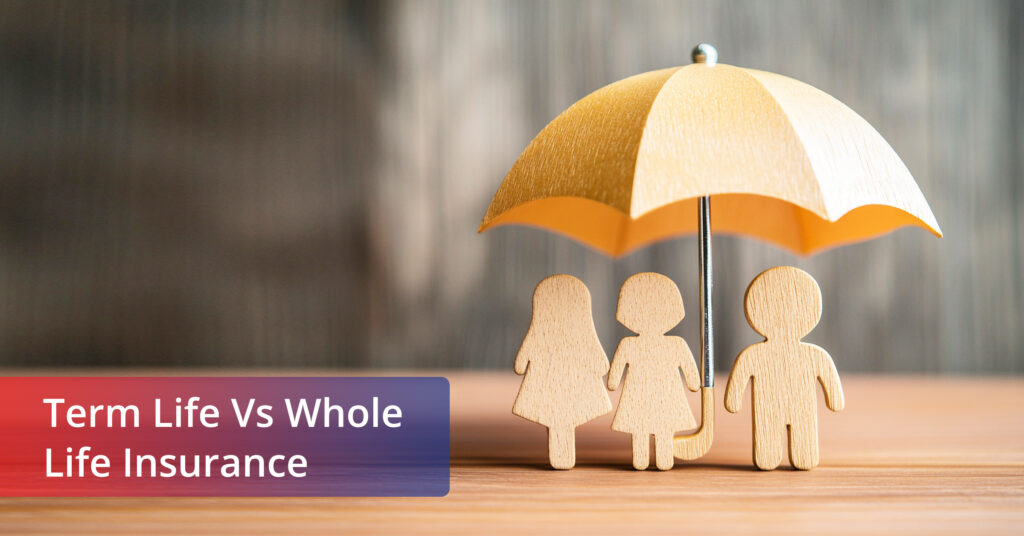In this blog, we will do a detailed comparison of Term life & Whole Life Insurance evaluating the pros & cons of both types of life insurance.
Getting flustered with insurance names and types is quite common. While searching for ‘life insurance’ options on Google, the phrase ‘time life insurance’ pops up often. Wondering what term life insurance is?? What differentiates the two? Broadly speaking, term life insurance is an affordable alternative to whole life insurance that lacks tax benefits and covers a specific period.
On the other hand, whole life insurance is comprehensive coverage. It lasts your entire life as long as you pay the premiums. Apart from being tax-free, it further includes a cash value that grows over time. Let’s take a closer look at the most important distinctions between these two types of Insurance.
What is Term Life Insurance?
Term life insurance provides coverage for a set period. The tenure of this kind of life insurance is usually between 10 and 30 years. In case of the death of the policyholder during this term, the nominee gets paid.
Compared with Whole Life Insurance, this one is more affordable as it only pays out in the event that the death happens while the term is still active. The relatively low cost of term life is another attractive feature, especially for growing young families. It provides necessary monetary inputs without having to spend much. The term can also be extended or reduced to fit your specific needs. This customization can save costs and give loved ones a sense of security.
Pros of Term Life Insurance
Apart from being more cost-effective than long-term coverages, other Life insurance benefits include-
- Term Life Insurance terms are straightforward and easy to understand
- Term Life insurance policies are even more advantageous for single parents. They provide basic financial security for their children until they are legally responsible for themselves.
- You can also use a term policy to provide extra coverage alongside a whole-life policy for a limited time.
- Term life Insurance premiums are quite affordable. One can choose to play monthly, quarterly, or annually.
Cons of Term Life Insurance
- The biggest disadvantage of term life insurance is that it provides coverage only for a specific number of years. If they expire, they don’t offer protection unless the policy is either renewed or transitioned into a different kind.
- Term life Insurance Policies do not include a cash value, and therefore, they cannot be used for building wealth or tax planning.
- Term life Insurance premiums can be influenced by a number of things. Premiums will rise for a longer coverage period or more terminal benefits. Moreover, pre-existing medical issues can boost rates, and some policies involve medical evaluations.
What is Whole Life Insurance?
Whole life insurance policies keep you insured for the entire duration of your life. This policy does not have an expiration date, as is the case with term life insurance policies. These premiums remain fixed during your lifetime and do not increase as the risks advance with age. Whole life generally costs more than a typical life insurance.
It functions as both Insurance and an investment. The policy grows a cash value that accumulates tax-free over time. This cash value can be accessed through loans or withdrawals. When it comes to whole-life insurance, you are not required to select a term duration. For long-term financial planning, it’s a good choice because the death benefit is guaranteed.
Pros of Whole Life Insurance
- One of the standout benefits of whole life insurance is the ability to borrow against or withdraw from cash value.
- Borrowings and withdrawals are usually tax-exempt. The loans often come with favorable terms.
- Whole Life Insurance premiums are fixed for a lifetime. You are charged the same monthly rate, which makes for easy financial planning and budgeting.
- A Whole Life Insurance Policy generally comes with a guaranteed interest rate on the cash value, ensuring it grows over time.
- Additionally, some plans allow for dividends, which can increase your return considerably. These dividends can be reinvested to increase your cash value or buy more Insurance.
Cons of Whole Life Insurance
- Whole life insurance typically costs significantly more than term policies—often around 17 times more for the same death benefit. The added cost comes from both the insurance and investment components, making it a financial commitment.
- If you decide to terminate your policy within the first few years, you might face surrender charges. These fees can be substantial and can impact your cash value. Therefore, you need to go through the Whole Life Insurance terms carefully.
- Any outstanding loans will reduce your death benefit. If you take a loan from your policy and don’t repay it, your beneficiaries will receive less upon your death. For instance, a $50,000 loan means your beneficiaries will get $50,000 less, plus any interest if unpaid.
- Whole Life Insurance types can be more complex than term policies. If you no longer need the coverage or can’t afford the payments, stopping payments isn’t as straightforward as with term insurance. Depending on the provider, you may incur a significant surrender charge if you choose to cancel your policy early.
Term Life vs Whole Life Insurance- Which One is Better For You?
The answer really hinges on your personal needs and preferences. If you’re looking for coverage for a specific period—like when you have young children to care for—term life insurance in the USA could be the better choice. It offers lower premiums, making it more budget-friendly for short-term needs.
However, if you’re after lifelong coverage, whole life insurance is likely the way to go. Whole-life policies provide permanent protection and come with additional benefits. The cash value component allows you to borrow against or withdraw funds during your lifetime, offering flexibility as your needs evolve.
When to Transition from Term to Whole Life
If your term policy includes a conversion option, consider switching to whole life if your goals, income, or health circumstances change. Converting allows you to start building cash value, which can be beneficial for retirement or unexpected expenses later in life.
As you age, you might find it easier to afford the higher premiums of whole-life Insurance. If a serious health issue arises, converting your term policy may be your best option for securing permanent Insurance, especially if buying a new policy becomes challenging.
Conclusion
Looking for affordable and comprehensive life insurance? Exceed Insurance offers top-tier life insurance coverage in the U.S. with flexible payment plans and customized policies. Protect your loved ones from financial strain with a policy that ensures a lump-sum payout after your passing or once the policy’s term ends.
Whether you prefer term life for a set period or whole life for lifelong coverage with added cash value, Exceed Insurance has you covered. Get a quote online or call today to learn about different life insurance policy types!
Recommended read: Life Insurance Guide
Frequently Asked Questions:
- What is the difference between Term Life and Whole Life Insurance?
Term life covers a set period, while whole life provides lifelong coverage and builds cash value.
- Can I access the cash value of a Whole Life Insurance policy?
Yes, you can access the cash value through loans or withdrawals.
- Is Term Life Insurance more affordable than Whole Life Insurance?
Yes, term life insurance is generally more affordable than whole life insurance.






